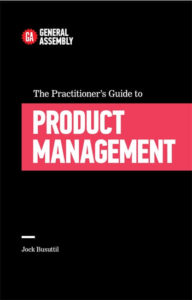
PRODUCTHEAD: 2022 in review
PRODUCTHEAD is a regular newsletter of product management goodness,
curated by Jock Busuttil.
last product #
tl;dr
Reflecting on product management in 2022
The most opened PRODUCTHEAD editions of 2022
Back in the new year :-)
a favour: please share this with other product people
every PRODUCTHEAD edition is online for you to refer back to
hello
2022 has felt like a year in limbo for me. After the drama of COVID-19, I think I was hoping for a return to something approximating normal. Well, about as normal as product management ever was, anyway. Instead, it’s felt to me a little subdued. As if we’ve all been keeping our heads down and getting on with things.
If I were to speculate, this may be for the simple reason that we are dealing with the after-effects of the COVID disruption and continue to have a lot on our plates. Perhaps it’s because our altered working habits have become permanent, and we’re not quite ready to change everything up again.
World events affect us, whether directly or indirectly. Without wishing to underplay their significance, they all raise the level of background drama in our lives. Although we may have become accustomed to living under this pressure, it’s also okay to hope for calmer times. Remember to cut yourself some slack and be kind to yourself.
I started the year with optimism. Looking back, 2022 has had its share of triumphs and setbacks, but broadly I feel we’re making progress again. I hope that 2023 continues that trend.
For my last PRODUCTHEAD newsletter in 2022, I’d like to reflect on a few events and trends I’ve observed.
Pendo acquires Mind The Product #
Early in February, Pendo’s acquisition of Mind The Product felt bittersweet. On the one hand, I was thrilled for my friends that they’d successfully negotiated an exit for their business. More so because they’d done this in spite of being in the business of running large-scale conferences in the midst of a global pandemic. And yet it also felt like the end of an era.
Despite its increasing size and reach, Mind The Product had always felt like a passion project: conferences were always friendly, welcoming and convivial, not corporate. The founders continued to don their light blue t-shirts and muck in with the rest of the volunteers and staff. They remained active participants in the product management community they’d fostered with the same playful humility and humour they’d started with a decade earlier.
I’m sure Mind The Product will continue to provide great value to its global product community under the ownership of Pendo. But (to me at least) it will feel … different.
Is specialisation just another fad? #
2022 has been the year of emerging specialisations in product management. Amongst others, we’ve had growth product managers, product ops, and web3 product managers. Only time will tell whether the first two will be passing fads or of genuine utility to our profession.
As for web3, I am entirely unsurprised that the bubble surrounding the world of cryptocurrency has burst, exposing the scams, frauds and pyramid schemes within. I will shed no tears for the demise of the web3 product manager role.
As someone who is naturally sceptical, I question the motivation behind the emergence of specialist product management roles. Does the specialism mask the lack of more general product management experience (can only do one thing well)? Or does it highlight greater skill on top of their more general experience (can do lots of things, one especially well)?
Or is the name change just a cynical rebrand to command a higher salary than the more mundane job title of plain old ‘product manager’? I’ve been just as dubious in the past of jobs such as ‘technical product manager’ as I am about the more recent ‘growth product manager’.
Personally I think one of the defining characteristics of product management is that it is a generalist role. We may not be doing everything all of the time, but our value comes from being able to turn our hand to whatever task is most important and urgent, within the context of creating a successful product. And of course to do that we rely on collaboration with specialists for specific tasks.
If you choose to specialise in one specific aspect of product delivery to the exclusion of all others, that’s absolutely fine. But by doing so, my view is that you are no longer fulfilling the generalist role of product manager — so it only confuses matters by continuing to call yourself one.
No shortcuts #
It’s great to see more people wanting to become product managers. If nothing else, it shows that that the professional community’s hard work to raise the profile of product management is paying off. However, with that increased attention comes confusion. Possibly through naivety (or simple ignorance) about what the role involves, quite a few people seem to think the path to becoming a product manager is much easier than it is in reality.
It is hard work to become a good product manager and not everyone will succeed. There’s lots to learn, most of which revolves around how you interact with people, resolve conflicts and deal with uncertainty. It’s difficult to learn this stuff solely from a book, blog or training course because it’s so dependent on context. What happens to be the right approach in one situation is not guaranteed to work in another.
So no, you can’t just do a quick 3-day course and start calling yourself a product manager. There are no shortcuts to gaining the valuable experience you’ll need. Equally, there is no one, prescribed path to gaining that experience either, which is very much a positive. All are welcome — providing you can take the underlying principles to heart.
Final thoughts #
Thank you for your readership this year; I’m grateful for your support. May I also wish you and yours all the best for the holiday period and 2023.
I’ll be back in the new year with more product management goodness for you after the holiday break.
Speak to you soon,
Jock
what to think about this week
These have been the top five most opened editions of PRODUCTHEAD this year:
Managing mature products
Ways to extend a product’s life cycle: frequent usage; varied usage; new users; new uses
Sometimes removing features is more effective than adding them
You can’t change the customer, but you can change your company’s process, strategy and culture
Give your team time and permission to check you’re moving the right metrics
Data is not a silver bullet and won’t solve your company’s trust issues
Don’t keep stuffing your product with features
[PRODUCTHEAD / I Manage Products]
Service mapping for product managers
Service maps help teams and stakeholders to understand interactions with a service across touchpoints over time
They provide a visual representation of an abstract and often wide-reaching process
Think of your service like a theatre: front stage, backstage and behind the scenes
Service maps help your team to tell their story to the wider organisation
How do users interact with your product?
[PRODUCTHEAD / I Manage Products]
Component teams, feature teams and centralised skill teams
A component team’s focus on a specific technology can result in being less user-centric
Feature teams are better suited to deal with innovation, uncertainty, and change
Centralised skill teams should aim to make themselves redundant by disseminating knowledge
Breaking down the silos between teams
[PRODUCTHEAD / I Manage Products]
Writing a product manager job description
The wording of your product manager job description could be putting off good candidates
Listing excessive requirements for the role will deter risk-averse candidates
Think about why you’re hiring and the candidate attributes you need most
Don’t copy-and-paste other job descriptions — they won’t describe what your organisation needs
What to include (and what not to)
[PRODUCTHEAD / I Manage Products]
Presenting to inform, educate and entertain
Story structure and the right content give your presentation more impact
Try to create presentations that captivate, not subdue
A perception audit helps narrow the gap between how you perceive yourself and how others see you
Good breathing technique when speaking both calms you and produces a better sound
Pitch it right for your audience
[PRODUCTHEAD / I Manage Products]
recent posts
Will platforms conquer the world?
Product managers of software and hardware platforms face unique challenges that PMs of ‘regular’ products do not.
In this panel discussion, Hans-Bernd Kittlaus discusses platform product management with Samira Negm, Peter Stadlinger and Jock Busuttil.
[I Manage Products]
As head of product, should I be a player-manager, or hire and delegate?
“There’s plenty that needs doing with the products. I could focus on the hiring process, but the only product manager on my team has their hands full, so I can’t delegate any more to them. I could get stuck in with the products myself as a player-manager, but this means I won’t have time to hire.”
[I Manage Products]
Billion-dollar platforms — how they did it
I was asked recently whether platforms will conquer the world. My view? They already have. In this article I share how they’ve done it, and how you can successfully bring your own platform to market.
[I Manage Products]
can we help you?
Product People is a product management services company. We can help you through consultancy, training and coaching. Just contact us if you need our help!
Helping people build better products, more successfully, since 2012.
PRODUCTHEAD is a newsletter for product people of all varieties, and is lovingly crafted from a well-needed rest.


Leave a Reply